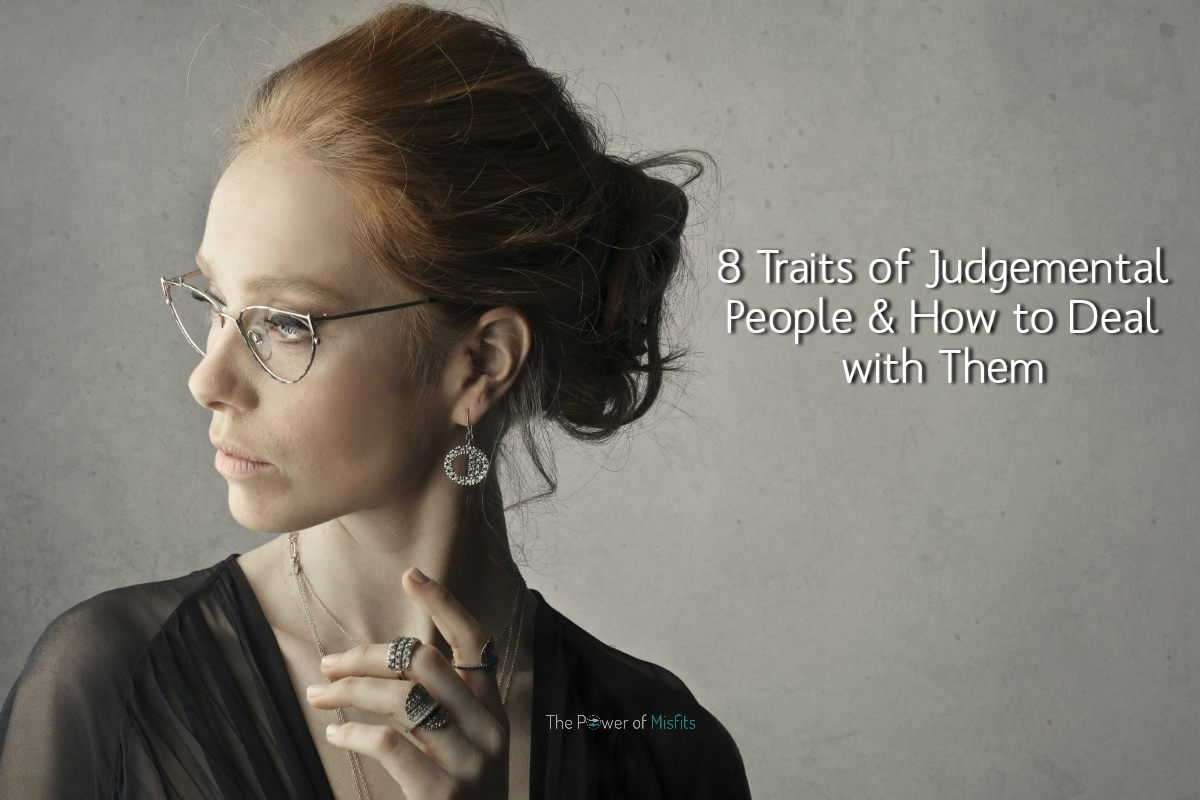Judging others is a natural human behavior. It helps us make sense of those around us and know what to expect. But overly judgemental people are a different story.
They are busy looking for faults in others and criticizing their choices and behaviors. They are unavoidable – we all have that judgemental family member or co-worker who poisons everyone’s life.
So how to recognize such characters in your life? And most importantly, how to deal with them?
8 Traits of Judgemental People
1. They see everything in a negative light
A judgemental person’s toxicity goes beyond negativity toward others. They are also pessimistic about life in general. They have a persistent tendency to dwell on problems and focus on the negative aspects of everything.
Instead of looking for a way out of a difficult situation, they complain and blame others. Instead of enjoying the moment of success, they worry about future failure.
It seems that they are unable to enjoy life and see the beauty of the world. Judgemental personalities always need to put a fly into the ointment.
2. Criticism is their favorite hobby
Someone who is judgemental is looking for opportunities to criticize others. Be it a celebrity with alcohol problems or a clumsy co-worker, a judgemental person will give a lengthy speech about their views on the subject.
They never approve of others’ decisions and lifestyles. A person with a judgemental attitude will always find something to criticize you for. Be it your outfit, hobby, or habit, they won’t say a good word about it.
3. They don’t shy away from voicing their opinions, even when no one asks them to
Whether you asked for their opinion or not, a judgemental character will voice it no matter what.
Imagine a situation. You are talking to a work friend about your plans for the weekend. You are going fishing with your father. A judgemental co-worker who is standing nearby will intrude on the conversation, saying that fishing is wrong and you gotta be more environmentally conscious.
Judgemental people can be remarkably nosy and indiscreet. It’s because they believe that their opinions are so valuable that everyone should listen to them.
4. They are always right
They are also genuinely convinced that they never make mistakes and their opinions just can’t be false. When something goes wrong, it’s always someone else’s fault.
Judgemental people have a double standard when it comes to mistakes. On the one hand, they judge others harshly for their faults. On the other hand, they never admit theirs.
Judgemental folks are highly inflexible toward different beliefs and views than their own. And, of course, they don’t miss the chance to judge someone for their “unreasonable and stupid” opinions.
In reality, they just feel threatened because someone else dares to believe in different things than they do.
5. They have a patronizing attitude

Judgemental people love demonstrating their wisdom and expertise. They know better than anyone, remember?
Since they are convinced that they are always right, they will impose their opinions on others. And they will do it in a patronizing way.
For example, you are talking about your relationship problems with your judgemental friend. She will instantly label your boyfriend as a narcissist/abuser/etc. and convince you that he was the wrong choice in the first place.
She will probably also say that you are too silly or inexperienced to have fallen for him. And that you should change your attitude toward men. The conversation will feel as if you are a first-grader being lectured by a teacher.
6. They are dream killers
Judgemental people can be toxic to those around them. If you have a judgemental family member, think twice before sharing your aspirations with them.
Be sure that they will find holes in your plans and try to convince you that you are not going to accomplish anything. Such people will belittle your dreams and make you feel silly and insignificant.
If they are mean enough, they might even make fun of your ambitions, which can damage your self-esteem.
7. Demeaning others makes them feel good
People with a judgemental attitude often project their insecurities on others, especially those who won’t stand up for themselves easily.
Their low self-esteem is what makes them demean and judge other people. It’s a way to feel on top and superior to those around them.
That’s why your judgemental boss will most likely target that quiet IT guy as an object of criticism and nagging. He knows that he won’t fight back. So he will demean and insult that employee because it makes him feel good about himself.
8. They are narrow-minded and biased thinkers
Judgemental people jump to conclusions and see life in black and white. They see a tattooed guy and automatically assume he isn’t a serious person.
They also love generalizing and labeling other people. If their ex cheated on them, then it means everyone does. If a woman raised her voice when talking to her child, she is an abusive mother.
All these thought patterns are examples of cognitive biases – mental shortcuts that cloud our perception. A judgemental person’s mind is full of these biases, and that’s why they have such a narrow-minded approach to life.
How to Deal with a Judgemental Person

1. Don’t take it personally
The first step to dealing with a judgemental parent or co-worker is to realize that it’s not about you.
Their bitter attitude reflects their own problems. They may have low self-esteem or be deeply unhappy. It could be that their life is empty and they have nothing or nobody to live for.
So judgemental individuals project their misery on the surrounding world. Shifting the focus from themselves to others gives them temporary relief.
Therefore, if you regularly deal with someone who is judgemental, don’t take it personally. Keep in mind that what they say about you is a reflection of who they are.
2. Don’t share too much with them
Sometimes overly critical people are found in our immediate circle. What to do if you have a judgemental mother or sibling? You can’t just cut ties with them – they are your family after all.
So the solution is to avoid sharing too much information about yourself. Whenever you visit your mother, don’t tell her about your plans or marriage problems. Because she will use it against you.
If you are not in a mood for being lectured, give away as little information as possible. Avoid topics you know will fuel an argument, such as politics or religion.
Judgemental people don’t listen to others, so it’s pointless to try to change their minds even if there are obvious gaps in their perception.
3. Set boundaries

If your judgemental friend is particularly intrusive, you have no choice but to set firm boundaries. For example, when he makes belittling remarks about your new girlfriend, tell him that he has no right to mess with your love life.
If your judgemental father criticizes your career choice, tell him that you are an adult now and make decisions for yourself.
Make sure you don’t end up justifying yourself though as this is what judgemental personalities want. Instead, you need to make them realize that you didn’t ask for their opinion in the first place and they have no right to judge your choices.
Typically, judgemental people pick weaker targets who struggle to stand up for themselves. So, if you set clear boundaries, they will think twice before invading your personal space the next time.
4. Don’t drop to their level
It can be tempting to insult a judgemental person back. Or to belittle what they do and make fun of what they believe in.
But it won’t bring any positive results. You will just drop down to their level. Instead, ignore them. When they get judgemental and talk to you with a condescending attitude, escape the conversation.
Show them that you don’t find their opinion important. And that their words don’t affect you.
5. Keep a distance
If someone in your social circle is particularly toxic and you find yourself feeling small and inadequate after hanging out with them, keep a distance from this person.
It’s pointless to maintain a connection with people who ruin your self-confidence and optimism. They will only drag you down and poison your mind with negative thoughts.
So in some cases, the best approach is to stay away from a judgemental person. Or at least limit your contact with them.
Why Are People So Judgemental?

As we said above, judging others is a natural human instinct. Forming quick first impressions helps us understand who we can trust, making this ability crucial for our survival.
But what if someone in your circle is too judgemental and critical?
If you’d like to reach a deeper understanding of judgemental people and their motives, here are a few reasons behind their behaviors:
1. They are insecure
Insecurities and self-esteem issues are probably the most common reason why people are so judgemental.
Demeaning someone else is their way to assert themselves and show their superiority. Because in reality, they are deeply insecure.
Judging other people and belittling their aspirations has a soothing effect as it takes away the emphasis from their own problems.
Judgemental individuals love comparing themselves to those who are less accomplished and fortunate than they are. It gives them an illusion of superiority and relief from their low self-worth.
2. They are unhappy and envious
Unhappy people often grow to be bitter and envious. They feel like their misery is someone else’s fault, so they get angry at the whole world.
This is what can make them so unfriendly and judgemental toward others. They just can’t forgive other people for their happiness.
So when they see someone else pursuing their dreams while they’ve wasted their life in the job they hate, they find salvation in being judgemental.
3. They have trust issues
Being overly judgemental often stems from the inability to trust other people. This is when a natural survival instinct grows into irrational suspicion and hostility toward others.
Deep down, a judgemental person wants to be loved and accepted. But a traumatic experience from the past or an unhealthy thought pattern doesn’t allow them to get close to anyone.
This is why they find comfort in judging and rejecting those around them. Labeling people as losers, morons, freaks, etc. gives them a tangible excuse to not trust them and, therefore, stay away from them.
4. They suffer from unhealthy perfectionism and an illusion of control

Typically, judgemental people are rigid thinkers. They struggle to understand and accept other points of view rather than their own.
This often has to do with an illusion of control where a person has an unhealthy need to control everything and everyone.
They can’t bear the fact that other people find meaning and happiness in different things and beliefs than their own. To them, it feels utterly wrong and, therefore, is to be judged.
Sometimes judgemental personalities also happen to be perfectionists. They are highly demanding of both themselves and others. This counterproductive trait doesn’t allow them to relax and be more open-minded and accepting.
So, they condemn everyone and everything around them. But let me tell you something – they also condemn themselves.
5. They had demanding and overly critical parents
Many of our unhealthy traits and behaviors take roots in our childhood. A person can grow to be judgemental if their parents were too critical and demanding.
Children learn from their parents. So if judging, belittling, and criticizing one another was a regular practice in your family, you will likely grow to believe that this attitude is a norm.
Moreover, overly critical parenting has long-term consequences on a child’s psyche. It damages the little one’s self-esteem and sense of self-worth, which can later evolve into bitterness toward others.
To sum up, remember that judgemental people are unavoidable, but you can always stop their toxic influence on your life. All it takes is to establish firm personal boundaries and not allow their criticisms to affect you.
Keep in mind that they are trying to deal with their own darkness by condemning others, so don’t take their words to heart.


